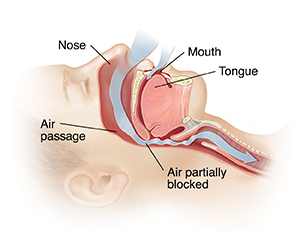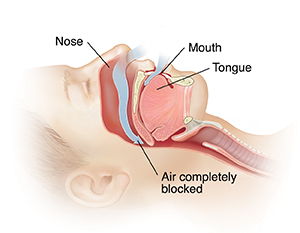What Are Snoring and Obstructive Sleep Apnea?
If you’ve ever had a stuffed-up nose, you know the feeling of trying to breathe through a very narrow passageway. This is what happens in your throat when you snore. While you sleep, structures in your throat partly block your air passage. This makes the passage narrow and hard to breathe through. This can interrupt sleep. When this happens, it is called obstructive sleep apnea.
Snoring
If your throat structures are too large or the muscles relax too much during sleep, the air passage may be partly blocked for a brief moment. But the air eventually passes through. As air from the nose or mouth passes around this blockage, the throat structures vibrate. This causes the familiar sound of snoring. This snoring sound can be loud enough to disrupt the sleep of other people. Snoring gets worse as more and more of the air passage is blocked.

Obstructive sleep apnea
If the structures partly or completely block the throat, air can’t flow to the lungs at all. This is called hypopnea (decreased breathing) or apnea (meaning “no breathing”) for at least 10 seconds. The lungs aren’t getting fresh air. So the brain tells the body to wake up just enough to tighten the muscles and unblock the air passage. With an audible gasp, breathing starts again. This process may be repeated over and over again during the night. This can make your sleep fragmented with lighter stages of sleep. You may not remember waking up many times during the night. But because of lighter sleep, you will most likely feel tired the next day. The lack of sleep and fresh air can also strain your lungs, heart, and other organs. This may lead to problems such as high blood pressure, diabetes, changes in thinking, behavioral disorders, heart attack, or stroke.
 |
| Obstructive sleep apnea |
Problems in the nose and jaw
Problems in the structure of the nose may block breathing. A crooked (deviated) septum or swollen turbinates can make snoring worse or lead to apnea. Also, a receding jaw may make the tongue sit too far back. Then, it’s more likely to block the airway when you’re asleep.
Online Medical Reviewer:
Daphne Pierce-Smith RN MSN
Date Last Reviewed:
9/1/2024
© 2000-2025 The StayWell Company, LLC. All rights reserved. This information is not intended as a substitute for professional medical care. Always follow your healthcare professional's instructions.